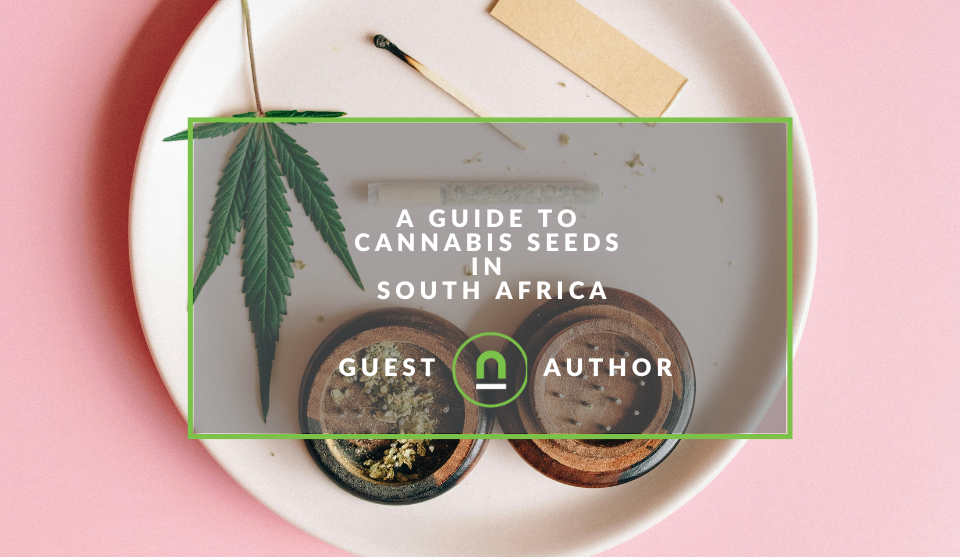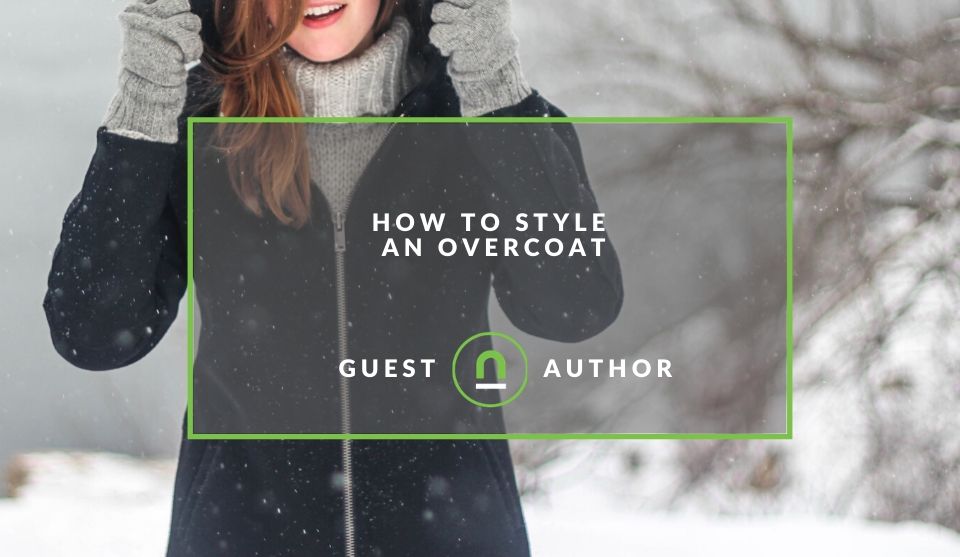Recent posts

Shopaholics
How to Choose A Perfect 2-Seater Couch for Small Spaces
28 February 2025

Money Talks
How Crypto Technology Continues To Revolutionise The Business World
27 February 2025

nichemarket Advice
How to Choose the Best Copy Trading Platforms for Maximum Return
24 February 2025

Mind, Body & Soul
A Guide to Cannabis Seeds in South Africa
21 February 2025
Popular posts
Extravaganza
Trending Music Hashtags To Get Your Posts Noticed
24 August 2018
Geek Chic
How To Fix iPhone/iPad Only Charging In Certain Positions
05 July 2020
Extravaganza
Trending Wedding Hashtags To Get Your Posts Noticed
18 September 2018
Money Talks
How To Find Coupons & Vouchers Online In South Africa
28 March 2019
How To Style An Overcoat
23 January 2020 | 1 comments | Posted by Jessica Sellers in Fashionista
Keeping the chill at bay when exploring during the winter months or on your winter holiday calls for the right gear. Having the right coat to keep you warm based on the conditions is essential, but it doesn't mean you cannot remain stylish when still keeping warm. Overcoats of today come in so many ranges of materials and styles that consumers are spoilt for choice. So when you have so many choices, it is important to evaluate each one to find which one would be right for you.
What is an overcoat?
An overcoat is perhaps the most versatile coat that is currently available for men. Most commonly made from wool, this coat can provide you with the ultimate gentleman look during the winter months. This coat has long been the traditional coat to wear with a suit, but now it can often be seen amongst denim jeans and a hoodie. So whether you are planning on attending a formal event or you are dressing smart-casual to an evening meal, you have plenty of options to remain stylish with this one garment.
The history Of the overcoat
The men’s overcoat has been a vital part of a gentleman’s wardrobe since it was invented in the late 18th century. They were often worn as formalwear to represent the wearer’s social status or as part of their uniform, both professional and military. Either way, since the 18th century the overcoat has been at the forefront of men’s fashion.
The future of the overcoat
Today, we consider the overcoat a classic style for Winter. Due to its Versatile and stylish nature, it has stood the test of time, and there is no reason why this is ever going to change. Every suit lover should own one; after all, it might be the only thing people see when you are out and about in the brutal winter weather.
Different styles & customisations available
When you think of an overcoat, you might have a completely different image in your head compared to me. The one thing that is widely acknowledged is that an overcoat is the outermost garment of an outfit. So what about style/customisations? There are so many options to choose from after all.
Here are a wide variety of the overcoats you can find globally:
Chesterfield coat
The chesterfield is a man’s overcoat with simple vertical seams, no side-back piece, and a velvet collar, usually in grey or black. What sets this coat apart from the others is the velvet collar which is dissimilar to any other style. Now lighter coloured varieties and coats without the collar are regularly seen, but a genuine chesterfield should always have a velvet collar.
This is the ultimate single-breasted overcoat. In London, one of the first to adopt it in the middle of the nineteenth century was the Count of Chesterfield (hence the name). This style suits a formal wardrobe. Wear with a three-piece suit, or a pair of suit trousers with a high neck jumper to ensure you complete the look.
Trench coat
The trench coat is particularly light, making this coat suitable for wear in Autumn. The trench coat is a traditional and timeless model. The coat has initially been an item of clothing for Army officers (developed pre-war but adapted for use in the trenches of WW1), and you can see the military influence in the modern styles.
Traditionally available in beige/khaki, its design is characterised by distinctive shoulder pads, double-breast fastening, chin-strap, either a removable or attached belt and a triangular brim overlapping the fastener. A trench coat is an indisputable and versatile garment that is suitable for formal and informal situations.
Loden overcoat
The “Loden” overcoat is made from matted and waterproof wool. Originally Tyrolean, the earthy green colour that can be found on the Loden overcoat is now internationally available.
This traditional style overcoat could be found typically in the middle class, students and academia in the 60s and 70s.
The features include a shirt collar, buttons in braided leather (originally in bone), armholes hidden by stitched flaps, along fold on the back, slanting pockets with flaps and bands with buttons at the end of the sleeves.
Peacoat
A peacoat, also known as a caban, is an overcoat, generally of a navy coloured heavy wool, that was initially worn by sailors.
Today the style is considered a classic, and pea coats are now worn by all manner of individuals. In some versions of this style, peacoats have evolved to include hoods to protect consumers from wet weather.
Pea coats are characterised by short length, broad lapels, double-breasted fronts, often large wooden, metal or plastic buttons, and vertical or slash pockets.
Ulster
When you think of an ulster coat, you should think of an elegantly designed overcoat that is worn usually over the winter months. A genuine Ulster is made out of tweed or more specifically Donegal Tweed. This is a kind of heavy tweed and was initially invented in the province of Ulster. It is characterised by its rustic hand-woven look, as well as its multicoloured dots. Modern-day tailors such as Edit Suits Co, use traditional Italian mills such as Loro Piana for a very expensive looking, traditional Ulster.Fabrics
Wool
Wool is natural and breathable. It is known for its insulating properties and softness. You may consider splashing out on a 100% wool version or go for wool blends – both are viable options that will keep you warm. The good thing about sheep’s wool is that the finishes are customisable. Some examples are boiled wool, flannel, gabardine and felt. Sheep’s wool is also water-resistant, which makes it perfect for snowy weather.Cashmere
Cashmere is far more expensive than sheep’s wool, but the difference is clear. Fabulously soft and silky, it is probably one of the best picks for one particular coat to use for special occasions. Cashmere is more challenging to care for, but it is worth the risk. Anyone who has owned a cashmere coat before will also agree.Mohair
With its distinctive frizzy look, mohair is ideal for winter coats and jackets. Made from the fleece of the Angora goat. The material comes second to none in terms of natural durability. It is warm and fuzzy, and it fits both men’s and women’s wardrobes. Either pure or blended with wool, mohair fabrics will keep you comfortably warm all season long.
Tweed
Tweed fabrics are either wool or wool blends; the classic colourways have always been all about earthy tones. Tweeds are sturdy and durable; they are one of those timeless options that never go out of fashion. They are also highly versatile: lightweight tweeds woven with fancy yarn are perfect for those Chanelesque looks, while Harris tweed is the iconic fabric for gentlemen.
Fur/Faux fur
One of the oldest materials used by people to stay warm in the winter, fur is a ‘yes’ when it comes to coats. Mink, chinchilla, sable, fox, beaver fur are just some varieties. It is also available in a synthetic form. You get the same gorgeous look and texture while remaining animal-friendly. If you want to add some fur to your wardrobe, make sure you buy a high-quality fabric, which is usually more expensive. Poor quality fur will not ward off the cold.
Customisations
If you have an ideal overcoat in mind and want to create something a little more unique, you have many customisation options available to you. If you wish to widen the traditional lapels/remove them altogether, pick a particular button style out of the thousands of options available, or finally you want to customise the original single-breasted style and move to a double-breasted fashion, then this is all possible.
Tell us your story
Would you like to write for nichemarket just like Jessica has? Find out how to submit a guest post and when you're ready, you can contact us.
Are you looking to promote your business?
South African fashion businesses and freelancers can create your free business listing on nichemarket. The more information you provide about your business, the easier it will be for your customers to find you online.
Registering with nichemarket is easy; all you will need to do is head over to our sign up form and follow the instructions. If you require a more detailed guide on how to create your profile or your listing, then we highly recommend you check out the following articles.
Recommended reading
If you enjoyed this post and have time to spare why not check out these related posts and dive deeper down the rabbit hole that is fashion.
- A Clear Strategy For Using Instagram Accounts On Fashion Brands
- Trending Fashion Hashtags To Get Your Posts Noticed
- 5 Reasons Why Fashion Brands Introduce New logos
- Common Fashion Blogging Mistakes That Affect SEO
- How to build a loyal audience for your fashion brand
- How To Drive Fashion Related Traffic From Instagram
Tags: Fashion, Coats, Guest Post
You might also like
How Crypto Technology Continues To Revolutionise The Business World
27 February 2025
Posted by Katrine Vidstid in Money Talks
Learn how cryptocurrencies impact more than just investing. Discover their revolutionary potential in business, from secure transactions to innovativ...
Read moreHow to Choose the Best Copy Trading Platforms for Maximum Return
24 February 2025
Posted by Cornelia Ekong in nichemarket Advice
How to select a copy trading platform by evaluating key features, trader performance, risk management tools, and costs to maximize your investment re...
Read more{{comment.sUserName}}
{{comment.iDayLastEdit}} day ago
{{comment.iDayLastEdit}} days ago
 {{blogcategory.sCategoryName}}
{{blogcategory.sCategoryName}}
